- Home
- Tom Stoppard
Travesties Page 2
Travesties Read online
Page 2
JOYCE: ‘Lickspittle – capitalist – lackeys – of imperialism.’
(LENIN recognizes these words. He pauses, and approaches JOYCE.)
LENIN: Pardon! … Entschuldigung! … Scusi! … Excuse me!
JOYCE (Handing him the paper): Je vous en prie! Bitte! Prego! It’s perfectly all right!
(LENIN leaves. JOYCE is alone now.)
(Declaims) A librarianness of Zurisssh
only emerged from her niche
when a lack of response
to Nicht Reden! Silence!
obliged her to utter the plea –
CECILY (Entering as before): – ssssssh!
(JOYCE accedes to her request, puts on his hat, picks up his stick, and while she regards him with disapproval he leaves at a strolling pace, singing …)
JOYCE: If you ever go across the sea to Ireland …
It may be at the closing of the day …
You can sit and watch the moon rise over Claddagh
and watch the sun go down on Galway Bay …
(The stage now belongs to OLD CARR. The LIBRARY must now be replaced by the ROOM. Needless to say, the change should occur with as little disruption as possible, and the use of music as a bridge is probably desirable.)
(NOTE: In the original production, the Room contained a piano which was at different times used by Old Carr, and in this instance Old Carr played (very badly) the tune of Galway Bay while the set was changed; the piano being right downstage in a permanent position. It is possible that CARR has been immobile on stage from the beginning, an old man remembering …)
CARR: He was Irish, of course. Though not actually from Limerick – he was a Dublin man, Joyce, everybody knows that, couldn’t have written the book without. There was a young man from Dublin, tum-ti-ti-tum-ti-ti troublin’ … I used to have quite a knack for it, but there’s little encouragement for that sort of thing in the Consular Service. Not a great patron of poetry, the Service, didn’t push it, never made a feature of it. I mean you’d never say that a facility for rhyme and metre was the sine qua non of advancement in the Consular Service … Didn’t discourage it, I’m not saying that, on the contrary, a most enlightened and cultivated body of men, fully sympathetic to all the arts (look no further than the occasion that brought us together, me and Joyce, brought him to this room, full support, a theatrical event of the first water, great success, personal triumph in the demanding role of Ernest, not Ernest, the other one, in at the top, have we got the cucumber sandwiches for Lady Bracknell, notwithstanding the unfortunate consequences. Irish lout. Not one to bear a grudge, however, not after all these years, and him dead in the cemetery up the hill, no hard feelings either side, unpleasant as it is to be dragged through the courts for a few francs (though it wasn’t the money, or the trousers for that matter), but, be that as it may, all in all, truth be told, the encouragement of poetry writing was not the primary concern of the British Consulate in Zurich in 1917, and now I’ve lost my knack for it. Too late to go back for it. Alas and alack for it. But I digress. No apologies required, constant digression being the saving grace of senile reminiscence.
My memoirs, is it, then? Life and times, friend of the famous. Memories of James Joyce. James Joyce As I Knew Him. The James Joyce I Knew. Through the Courts With James Joyce … What was he like, James Joyce, I am often asked. It is true that I knew him well at the height of his powers, his genius in full flood in the making of Ulysses, before publication and fame turned him into a public monument for pilgrim cameras more often than not in a velvet smoking jacket of an unknown colour, photography being in those days a black and white affair, but probably real blue if not empirical purple and sniffing a bunch of sultry violets that positively defy development, don’t go on, do it on my head, caviar for the general public, now then – Memories of James Joyce … It’s coming.
To those of us who knew him, Joyce’s genius was never in doubt. To be in his presence was to be aware of an amazing intellect bent on shaping itself into the permanent form of its own monument – the book the world now knows as Ulysses! Though at that time we were still calling it (I hope memory serves) by its original title, Elasticated Bloomers.
A prudish, prudent man, Joyce, in no way profligate or vulgar, and yet convivial, without being spend-thrift, and yet still without primness towards hard currency in all its transmutable and transferable forms and denominations, of which, however, he demanded only a sufficiency from the world at large, exhibiting a monkish unconcern for worldly and bodily comforts, without at the same time shutting himself off from the richness of human society, whose temptations, on the other hand, he met with an ascetic disregard tempered only by sudden and catastrophic aberrations – in short, a complex personality, an enigma, a contradictory spokesman for the truth, an obsessive litigant and yet an essentially private man who wished his total indifference to public notice to be universally recognized – in short a liar and a hypocrite, a tight-fisted, sponging, fornicating drunk not worth the paper, that’s that bit done.
Further recollections of a Consular Official in Whitest Switzerland. The Ups and Downs of Consular Life in Zurich During the Great War: A Sketch.
’Twas in the bustling metropolis of swiftly gliding trams and greystone banking houses, of cosmopolitan restaurants on the great stone banks of the swiftly-gliding snot-green (mucus mutandis) Limmat River, of jewelled escapements and refugees of all kinds, e.g. Lenin, there’s a point… Lenin As I Knew Him. The Lenin I Knew. Halfway to the Finland Station with V. I. Lenin: A Sketch. I well remember the first time I met Lenin, or as he was known on his library ticket, Vladimir Ilyich Ulyanov. To be in his presence was to be aware of a complex personality, enigmatic, magnetic, but not, I think, astigmatic, his piercing brown (if memory serves) eyes giving no hint of it. An essentially simple man, and yet an intellectual theoretician, bent, as I was already aware, on the seemingly impossible task of reshaping the civilized world into a federation of standing committees of workers’ deputies. As I shook the hand of this dynamic, gnomic and yet not, I think, anaemic stranger, who with his fine head of blond hair falling over his forehead had the clean-shaven look of a Scandinavian seafaring – hello, hello, got the wrong chap, has he? – take no notice, all come out in the wash, that’s the art of it. Fact of the matter, who (without benefit of historical perspective and the photograph album, Red Square packed to the corner stickers with comraderaderie, and now for our main speaker, balding bearded in the three-piece suit, good God if it isn’t Ulyanov!, knew him well, always sat between the window and Economics A–K etceterarera) well, take away all that, and who was he to Radek or Radek to him, or Martov or Martinov, Plekhanov, or he to Ulyanov for that matter? – in Zurich in 1917? Café conspirators, so what? Snowballs in hell. Snowballs at all, Lenin he only had one chance in a million, remember the time they had the meeting? – Social Democrats for Civil War in Europe. Total attendance: four.
Ulyanov, Mrs Ulyanov, Zinoviev and a police spy. And now they want to know what was he like? What was he like,
Lenin, I am often asked.
(He makes an effort).
To those of us who knew him Lenin’s greatness was never in doubt.
(He gives up again.)
So why didn’t you put a pound on him, you’d be a millionaire, like that chap who bet sixpence against the Titanic. No. Truth of the matter, who’d have thought big oaks from a corner room at number 14 Spiegelgasse? – now here’s a thing: two revolutions formed in the same street. Face to face in Spiegelgasse! Street of Revolution! A sketch. Meet by the sadly-sliding chagrinned Limmat River, strike west and immediately we find ourselves soaking wet, strike east and immediately we find ourselves in the Old Town, having left behind the banking bouncing metropolis of trampolines and chronometry of all kinds for here time has stopped in the riddled maze of alleyways and by the way you’d never believe a Swiss redlight district, pornographic fretwork shops, vice dens, get a grip on yourself, sorry, sorry, second right, third left – Spiegelgasse! – narrow, cobbl
ed, high old houses in a solid rank, number 14 the house of the narrow cobbler himself, Kammerer his name, Lenin his tenant – and across the way at Number One, the Meierei Bar, crucible of anti-art, cradle of Dada!!! Who? What? Whatsisay Dada?? You remember Dada! – historical halfway house between Futurism and Surrealism, twixt Marinetti and André Breton, ‘tween the before-the-war-to-end-all-wars years and the between-the-wars years – Dada! – down with reason, logic, causality, coherence, tradition, proportion, sense and consequence, my art belongs to Dada ‘cos Dada ‘e treats me so – well then, Memories of Dada by a Consular Friend of the Famous in Old Zurich: A Sketch.
What did it do in the Great War, Dada, I am often asked. How did it begin? where did it? when? what was it, who named it and why Dada? These are just some of the questions that continue to baffle Dadaists the world over. To those of us who lived through it Dada was, topographically speaking, the high point of Western European culture – I well remember as though it were yesteryear (oh where are they now?) how Hugo Ball – or was it Hans Arp? yes! – no – Picabia, was it? – no, Tzara – yes! – wrote his name in the snow with a walking stick and said: There! I think I’ll call it The Alps. Oh the yes-no’s of yesteryear. Whose only age done gone. Over the hills and far away the sixpounders pounding in howitzerland, no louder than the soft thud of snow falling off the roof – oh heavenl to be picked out – plucked out – blessed by the blood of a negligible wound and released into the folds of snow-covered hills – Oh, Switzerland! – unfurled like a white flag, pacific civilian Switzerland – the miraculous neutrality of it, the noncombatant impartiality of it, the non-aggression pacts of it, the international red cross of it – entente to the left, détente to the right, into the valley of the invalided blundered and wandered myself when young –
Carr of the Consulate! – first name Henry, that much is beyond dispute, I’m mentioned in the books.
For the rest I’d be willing to enter into discussion but not if you don’t mind correspondence, into matters of detail and chronology – I stand open to correction on all points, except for my height which can’t be far off, and the success of my performance, which I remember clearly, in the demanding role of Ernest (not Ernest, the other one) – that, and the sense of sheer relief at arriving in a state of rest, namely Switzerland, the still centre of the wheel of war. That’s really the thing – (CARR is now a young man in his drawing room in 1917. Ideally the actor should simply take off e.g. a hat and dressing gown – no wig or beard, no make-up – Carr’s age has been in his voice.) – the first thing to grasp about Switzerland is that there is no war here. Even when there is war everywhere else, there is no war in Switzerland.
BENNETT: Yes, sir.
(BENNETT has entered with a tray of tea things, set for two, with sandwiches.)
CARR: It is this complete absence of bellicosity, coupled with an ostentatious punctuality of public clocks, that gives the place its reassuring air of permanence. Switzerland, one instinctively feels, will not go away. Nor will it turn into somewhere else. You have no doubt heard allusions to the beneficial quality of the Swiss air, Bennett. The quality referred to is permanence.
BENNETT: Yes, sir.
CARR: Desperate men who have heard the clocks strike thirteen in Alsace, in Trieste, in Serbia and Montenegro, who have felt the ground shift beneath them in Estonia, Austro-Hungary and the Ottoman Empire, arrive in Switzerland and after a few deep breaths find that the ringing and buzzing in their ears has regulated itself into a soothing tick-tock, and that the ground beneath their feet, while invariably sloping, is as steady as an alp. Tonight I incline to the theatre; get me out the straight cut trouser with the blue satin stripe and the silk cutaway. I’ll wear the opal studs.
BENNETT: Yes, sir. I have put the newspapers and telegrams on the sideboard, sir.
CARR: Is there anything of interest?
BENNETT: The Neue Zuricher Zeitung and the Zuricher Post announce, respectively, an important Allied and German victory, each side gaining ground after inflicting heavy casualties on the other with little loss to itself.
CARR: Ah – yes … the war! Poor devils! How I wish I could get back to the trenches! – to my comrades in arms – the wonderful spirit out there in the mud and wire – the brave days and fearful nights. Bliss it was to see the dawn! To be alive was very heaven! Never in the whole history of human conflict was there anything to match the carnage – God’s blood!, the shot and shell! – graveyard stench! – Christ Jesu! – deserted by simpletons, they damn us to hell – ora pro nobis – quick! no, get me out! – I think to match the carnation, oxblood shot-silk cravat, starched, creased just so, asserted by a simple pin, the damask lapels – or a brown, no, biscuit – no – get me out the straight cut trouser with the blue satin stripe and the silk cutaway. I’ll wear the opal studs.
BENNETT: Yes, sir. I have put the newspapers and telegrams on the sideboard, sir.
CARR: Is there anything of interest?
BENNETT: The war continues to dominate the newspapers, sir.
CARR: Ah yes… the war, always the war …
(A note on the above: the scene (and most of the play) is under the erratic control of Old Carr’s memory, which is not notably reliable, and also of his various prejudices and delusions. One result is that the story (like a toy train perhaps) occasionally jumps the rails and has to be restarted at the point where it goes wild.
This scene has several of these ‘time slips’, indicated by the repetitions of the exchange between BENNETT and CARR about the ‘newspapers and telegrams’. Later in the play there are similar cycles as Carr’s memory drops a scene and then picks it up again with a repeated line (e.g. CARR and CECILY in the Library). It may be desirable to mark these moments more heavily by using an extraneous sound or a light effect, or both. The sound of a cuckoo-clock, artificially amplified, would be appropriate since it alludes to time and to Switzerland; in which case a naturalistic cuckoo-clock could be seen to strike during the here-and-now scene of Old Carr’s first monologue. At any rate the effect of these time-slips is not meant to be bewildering, and it should be made clear what is happening.)
I was in Savile Row when I heard the news, talking to the head cutter at Drewitt and Madge in a hounds-tooth check slightly flared behind the knee, quite unusual. Old Drewitt, or Madge, came in and told me. Never trusted the Hun, I remarked. Boche, he replied, and I, at that time unfamiliar with the appellation, turned on my heel and walked into Trimmett and Punch where I ordered a complete suit of Harris knicker-bockers with hacking vents. By the time they were ready, I was in France. Great days! Dawn breaking over no-man’s-land. Dewdrops glistening on the poppies in the early morning sun – All quiet on the Western Front… Tickety boo, tickety boo, tickety boo…
BENNETT: A gentleman called, sir. He did not wait.
CARR: What did he want?
BENNETT: He did not vouchsafe his business, sir. He left his card.
(Offers it on a salver.)
CARR: ‘Tristan Tzara. Dada Dada Dada.’ Did he have a stutter?
BENETT: He spoke French with a Romanian accent, and wore a monocle.
CARR: He is obviously trying to pass himself off as a spy. It is a form of vanity widely indulged in in Zurich during a European war, I believe, and adds greatly to the inconveniences caused by the crowds of real spies who conspire to fill the Odeon and the Terrasse, and make it almost impossible to get a table at either.
BENNETT: I have noticed him with a group of friends at the Terrasse, sir. Whether they were conspirators I could not, of course, tell.
CARR: To masquerade as a conspirator, or at any rate to speak French with a Romanian accent and wear a monocle, is at least as wicked as to be one; in fact, rather more wicked, since it gives a dishonest impression of perfidy, and, moreover, makes the over-crowding in the cafés gratuitous, being the result neither of genuine intrigue nor bona fide treachery – was it not, after all, La Rochefoucauld in his Maximes who had it that in Zurich in Spring in wartime a gentleman is h
ard put to find a vacant seat for the spurious spies peeping at police spies spying on spies eyeing counterspies what a bloody country even the cheese has got holes in it!! (Off the rails again, CARR has, on the above words, done violence to the inside of a cheese sandwich.)
BENNETT: Yes, sir. I have put the newspapers and telegrams on the sideboard, sir.
CARR: Is there anything of interest?
BENNETT: There is a revolution in Russia, sir.
CARR: Really? What sort of revolution?
BENNETT: A social revolution, sir.
CARR: A social revolution? Unaccompanied women smoking at the Opera, that sort of thing? …
BENNETT: Not precisely that, sir. It is more in the nature of a revolution of classes contraposed by the fissiparous disequilibrium of Russian society.
CARR: What do you mean, classes?
BENNETT: Masters and servants. As it were. Sir.
CARR: Oh. Masters and servants. Classes.
BENNETT (Expressionless as always): There have been scenes of violence.
CARR: I see. Well, I’m not in the least bit surprised, Bennett. I don’t wish to appear wise after the event, but anyone with half an acquaintance with Russian society could see that the day was not far off before the exploited class, disillusioned by the neglect of its interests, alarmed by the falling value of the rouble, and above all goaded beyond endurance by the insolent rapacity of its servants, should turn upon those butlers, footmen, cooks, valets … Parenthetically, Bennett, I see from your book that on Thursday night when Mr Tzara was dining with me, eight bottles of champagne are entered as having been consumed. I have had previous occasion to speak to you of the virtues of moderation, Bennett: this time I will only say, remember Russia.
BENNETT: Yes, sir. I have put the newspapers and telegrams on the sideboard, sir.
CARR: Is there anything of interest?
BENNETT: The Tsar has now abdicated, sir. There is a Provisional Government headed by Prince Lvov, with Guchkov as Minister of War, Milyukov Foreign Minister and the Socialist Kerensky as Minister of Justice. The inclusion of Kerensky is calculated to recommend the Government to a broad base of the common people, but effective authority has already been challenged by a committee of workers’ deputies, or ‘Soviet’, which has for the moment united all shades of socialist opinion. However there is no immediate prospect of the Socialists seizing power, for the revolution is regarded by them as the fulfilment of Karl Marx’s prophecy of a bourgeois capitalist era in Russia’s progress towards socialism. According to Marx, there is no way for a country to leap from autocracy to socialism: while the ultimate triumph of socialism is inevitable, being the necessary end of the process of dialectical materialism, it must be preceded by a bourgeois-capitalist stage of development. When the time is ripe, and not before, there will be a further revolution, led by the organized industrial workers, or ‘Proletariat’. Thus, it is the duty of Russian Marxists to welcome the present bourgeois revolution, even though it might take several generations to get through. As things stand, therefore, if one can be certain of anything it is that Russia is set fair to become a parliamentary democracy on the British model.

 The Dog It Was That Died and Other Plays
The Dog It Was That Died and Other Plays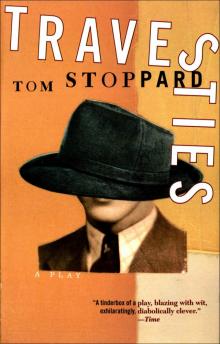 Travesties
Travesties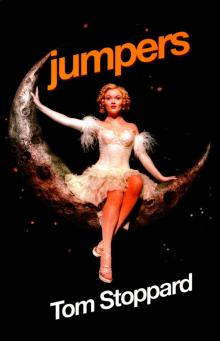 Jumpers
Jumpers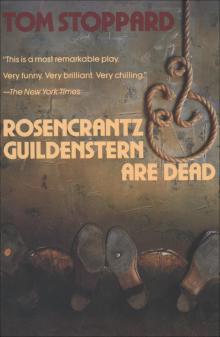 Rosencrantz and Guildenstern Are Dead
Rosencrantz and Guildenstern Are Dead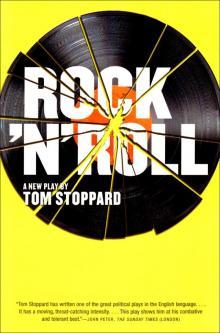 Rock 'N' Roll
Rock 'N' Roll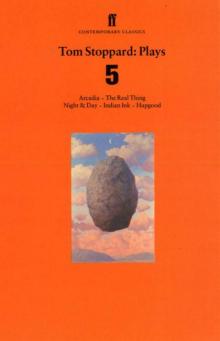 Plays 5
Plays 5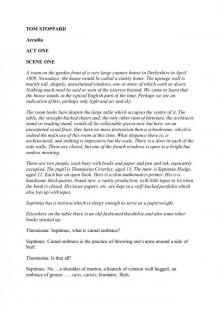 Arcadia
Arcadia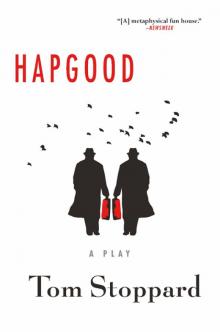 Hapgood
Hapgood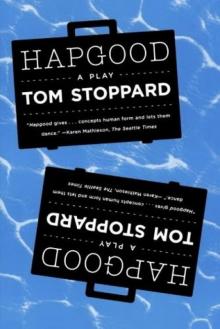 Hapgood: A Play
Hapgood: A Play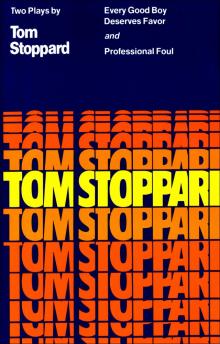 Every Good Boy Deserves Favor & Professional Foul
Every Good Boy Deserves Favor & Professional Foul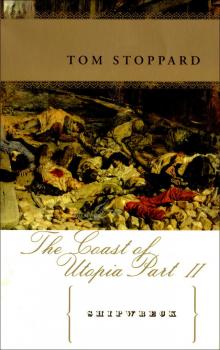 The Coast of Utopia: Voyage, Shipwreck, Salvage
The Coast of Utopia: Voyage, Shipwreck, Salvage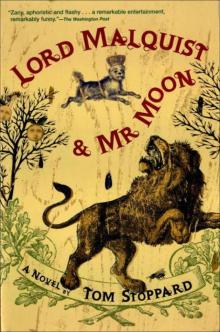 Lord Malquist & Mr. Moon
Lord Malquist & Mr. Moon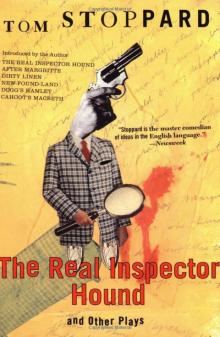 The Real Inspector Hound and Other Plays
The Real Inspector Hound and Other Plays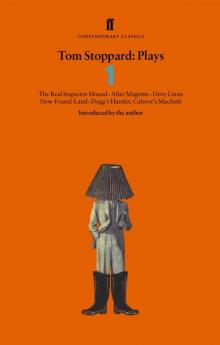 Tom Stoppard Plays 1
Tom Stoppard Plays 1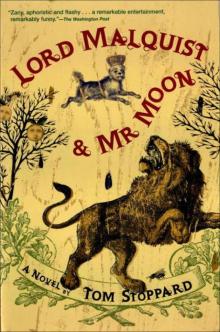 Lord Malquist & Mr. Moon: A Novel
Lord Malquist & Mr. Moon: A Novel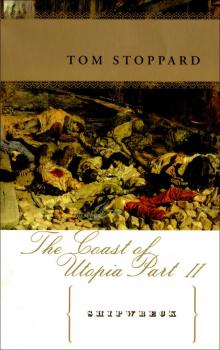 Shipwreck
Shipwreck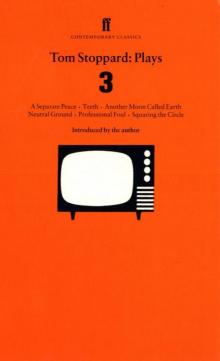 Tom Stoppard Plays 3
Tom Stoppard Plays 3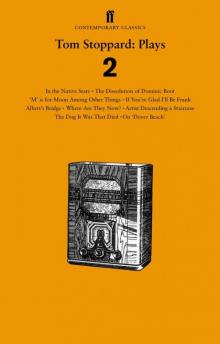 Tom Stoppard Plays 2
Tom Stoppard Plays 2 Rosencrantz and Guildenstern are dead. Arcadia
Rosencrantz and Guildenstern are dead. Arcadia